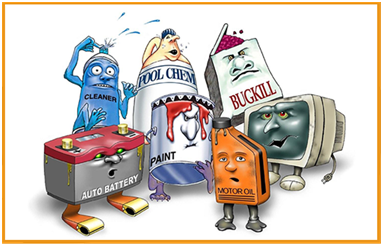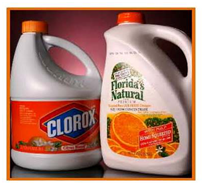COMMON HOUSEHOLD HAZARDS
When we think of hazardous
chemicals, we tend to think of manufacturing plants, train cars, or trucks.
While this is valid, we should also consider our own kitchen cabinets, garage,
pool and other places in our home where potentially harmful chemicals are a
part of our everyday life. We become so familiar with them that we may have
forgotten that they can injure or even kill us.

|
Here are a few common household chemicals and their hazards:
- Chlorine (pool) – toxic fumes, corrosive and highly reactive
- Muriatic Acid (pool) – corrosive, toxic by inhalation and highly reactive
- Ammonia – toxic fumes and very reactive with other common cleaners
- Lighter Fluid – flammable
- Propane (grill) – highly flammable
- Gasoline – flammable with vapors that are heavier than air and can travel to an ignition source
- Motor Oil – combustible
- Weed Killer – toxic by ingestion or absorption through skin
- Bug Killer – toxic by inhalation or absorption
- Drain Cleaner – toxic and corrosive
- Nail Polish Remover – flammable
- Paint – flammable
- Fertilizer – toxic, possibly flammable or explosive
No matter how comfortable you are with a product, here are some important safety reminders:
- ALWAYS follow label directions
- Never mix chemicals
- Use only for approved purposes and in approved concentrations
- Store and dispose of safely, in accordance with the manufacturer's instructions
- Keep away from children
- Never store in containers that look like food or drink
- Understand first aid directions
- Keep the number of your local poison control center handy
 |
TRANSPORTATION
Because of the design and safety features of chemical transportation containers, significant releases are rare. However, there are occasional accidents. If you are at home you will be notified through the media or local public safety agencies. Follow instructions quickly and carefully. You may be ordered to evacuate or to "shelter in place" depending on the chemicals involved. If ordered to evacuate do so immediately.
Shelter in Place means to stay inside where you are. If you are directed to shelter in place, close all windows and doors and turn off the air conditioner. Use duct tape and plastic sheeting to seal around doors, windows and other openings. If this is not available, damp towels or blankets can be used. The goal is to prevent outside air from entering your home.
Nuclear Power Plants
Florida has three nuclear power plants: Crystal River, north of Tampa; St. Lucie, north of Palm Beach; and Turkey Point, south of Miami. Even under worst-case conditions, an accidental release at any of these plants should not spread dangerous radioactivity over Southwest Florida.
Radioactive Materials
It is possible that a transportation accident could involve a radioactive substance. These materials are packed in limited quantities in very strong, well-marked containers. If you see a marked package or suspect radioactive material may be present, move away from the area and advise emergency responders. Do not attempt to move it yourself.
Biohazard Material
Another hazardous material that may be seen in transit is biohazard material, which may at first glance appear to be ordinary garbage.
Biohazard material could expose you to disease causing agents. You can usually avoid exposure by not contacting or handling the material or container. Call the authorities and explain the situation.